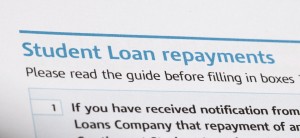 Most people are aware that, in most divorces, property is divided between the spouses, either by the court or by agreement. Most people might not be aware, however, that debt can also be divided between the spouses. While there are many types of debt a person can get into, student loan debt can be one of the trickier types of debt to deal with. This is because, while the debt may have been incurred during the marriage, only one spouse will materially benefit, after the divorce, from the education that was the cause of the debt.
Most people are aware that, in most divorces, property is divided between the spouses, either by the court or by agreement. Most people might not be aware, however, that debt can also be divided between the spouses. While there are many types of debt a person can get into, student loan debt can be one of the trickier types of debt to deal with. This is because, while the debt may have been incurred during the marriage, only one spouse will materially benefit, after the divorce, from the education that was the cause of the debt.
Equitable Distribution
While there are different ways for a court to calculate how property will be divided, Florida courts will tend to divide property based on an even split. Under Florida Statute 61.075, the courts will divide all marital assets and liabilities equally between the parties.
The division between marital property and personal property can sometimes be a thin one, but generally, marital property is any property, either asset or debt, that is obtained or incurred during the time of the marriage, or that is used for the benefit of the marriage. Under this definition, even forms of personal property, such as personal bank accounts or gifts, can be transmuted into marital property if they are mixed with marital property or used for the marriage.
That being said, the law does recognize that there are situations where an equal split is not necessarily a fair split, and allows the court to consider several factors when there is some justification for an unequal split, including:
-marital contributions by each spouse;
-economic circumstances of each spouse;
-the duration of the marriage;
-any interruption of personal career or education of either party;
-contributions of one spouse to the personal career or education of the other party; or
-any other factors necessary to do equity and justice between the parties.
Student Loans Incurred during Marriage
Much like other forms of debt, any student loan debt incurred during the marriage will be considered marital debt. Courts have been consistent in holding that any student loan debt incurred during the marriage is to be considered marital debt. The reasoning behind this holding is that, under Florida law, the division of marital debt between spouses should be equal, absent any valid justification for an unequal split. Interestingly enough, this can lead to some unfortunate outcomes for parties.
The Court’s Approach
A prior case from 2009, Rogers v. Rogers, is one of a few cases that provide an example of the imbalances that can come with an equal split of property.
In Rogers, the trial court had provided each party with an unequal portion of the student loan incurred by the wife. The trial court had awarded $45,000 of the student loan to the wife, whereas the husband obtained $5,000 of the debt. Unhappy with this outcome, the wife appealed the trial court’s decision, challenging the division of the student loan debt. In the end, the court of appeals agreed with the wife, and remanded the case for the trial court to reconsider distribution of the student loans.
While the court of appeals did state that there could be an unequal distribution of debt that was incurred during a marriage, it also stated that there needed to be some justification for the division. The court went on to state that the husband’s argument, that it would be inequitable for him to retain half of the debt while the wife retained all of the benefit, would not be a valid justification for unequal distribution.
What this Means
While this decision is not the only Florida court decision denying an unequal split of student loans, it is important to note that the court in Rogers did not mandate that any student loan debt will always be equally distributed between the spouses. It only denied an unequal distribution of debt based on the argument that the husband did not benefit from the debt.
The consequence of these decisions is that, while a party may indeed share student loan debt incurred during the marriage, the division can be uneven if there are any factors that justify an unequal distribution of the debt. Fortunately, for individuals who obtain a divorce in Florida, there are also several legal arguments that can be made in favor of the division of unequal distribution.
For example, due to the rising costs of education and student loan debt, it is not uncommon for one spouse to pursue an education or career path, while the other spouse supports the home, giving up on plenty of education and career opportunities. Naturally, with this sacrifice of education or career advancement, comes a decrease in economic capabilities, which can negatively impact a spouse after the divorce.
While no two cases are alike, whether you have to pay your spouse’s student loans can depend on the facts of your particular case. While you cannot be held responsible for any student loans incurred before or after the marriage, it is possible for the courts to equally divide any student loans incurred during the marriage between the spouses.
